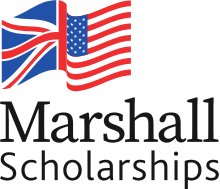
Back منحة مارشال Arabic Marshall Scholarship German Marshall Scholarship French Beasiswa Marshall ID Маршаллын тэтгэлэг Mongolian Стипендия Маршалла Russian 馬歇爾獎學金 Chinese
| Marshall Scholarship | |
|---|---|
 | |
| Awarded for | Americans to study for a graduate degree in the United Kingdom |
| Sponsored by | Marshall Aid Commemoration Commission |
| Established | 1953 by Parliament of the United Kingdom |
| Website | www |
The Marshall Scholarship is a postgraduate scholarship for "intellectually distinguished young Americans [and] their country's future leaders" to study at any university in the United Kingdom.[1] It is considered among the most prestigious scholarships for U.S. citizens, and along with the Fulbright Scholarship, it is the only broadly available scholarship available to Americans to study at any university in the United Kingdom.[2][3][4]
Created by the Parliament of the United Kingdom in 1953 as a living gift to the United States in recognition of the generosity of Secretary of State George C. Marshall and the Marshall Plan in the wake of World War II, the goal of the scholarship was to strengthen the Special Relationship between the two countries for "the good of mankind in this turbulent world."[5] The scholarships are awarded by the Marshall Aid Commemoration Commission and are largely funded by the British government.[6] The program was also the first major co-educational British graduate scholarship; one-third of the inaugural cohort in 1954 were women. With nearly 1,000 university-endorsed applicants in recent years—along with many more who apply but do not receive their university's endorsement—the Marshall Scholarship ranks among the most selective graduate scholarships for Americans. Among university-endorsed applicants, the acceptance rate typically ranges from three to four percent, reaching as low as 3.2 percent in 2015 and 3.6 percent for the 2025 class.[7][8]
There are over 1,900 Marshall Scholar alumni.[7] Many of these alumni have achieved distinctions and hold prestigious careers. In the government, current alumni include two Associate Justices of the Supreme Court of the United States, the director of the CIA, members of Congress and presidential cabinets, and state governors. Alumni are CEOs of companies such as LinkedIn and Dolby Labs, and managing editors of Time magazine and CNN. They are also deans of Yale Law School, Stanford Law School, the Harvard Kennedy School and Harvard College; and presidents of Duke University, Wellesley College, the Cooper Union, and Caltech. They also include two Nobel Laureates, a winner of the Kluge Prize, six Pulitzer Prize–winning authors, fourteen MacArthur Genius Grant awardees, NASA's youngest astronaut, two Oscar nominees, and one awardee of the Distinguished Flying Cross for service during the Iraq War.[9][10]
- ^ "United States no. 2 (1953). Proposed arrangements for the administration of the marshall scholarship scheme" (PDF). Marshall Scholarships. Archived from the original on May 1, 1953.
- ^ Ivry, Sara (January 12, 2003). "Other Roads". The New York Times. Retrieved July 23, 2022.
- ^ "10 Most Prestigious Scholarships In America". CBS News. January 26, 2011.
- ^ "Ambassador Names Marshall Scholars". The New York Times. December 15, 1996. p. 54. Retrieved July 23, 2022.
- ^ "Message from General George Marshall". www.marshallscholarship.org.
- ^ Marshall Aid Commemoration Commission / Year ending 30 September 2016 / 63rd Annual Report. Marshall Aid Commemoration Commission. March 2017. ISBN 978-1-4741-4013-3. Retrieved June 16, 2017.
- ^ a b "Annual Reports". Marshall Scholarships. Retrieved May 30, 2019.
- ^ Nietzel, Michael T. "Thirty-Six American Students Named Marshall Scholars For 2025". Forbes. Retrieved December 16, 2024.
- ^ "Alumni - Marshall Scholarships". www.marshallscholarship.org. Retrieved December 24, 2024.
- ^ "Marshall Scholar Alumni by Year from Association of Marshall Scholars". Association of Marshall Scholars. Retrieved December 24, 2024.